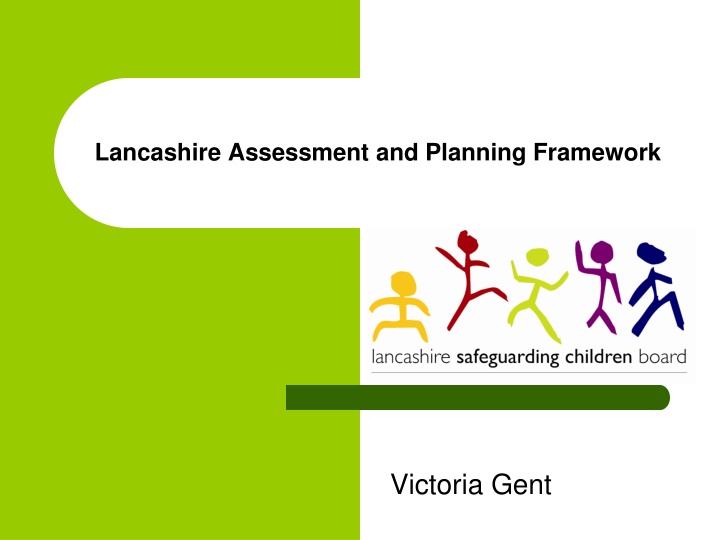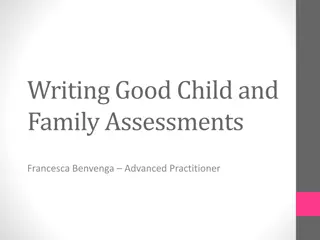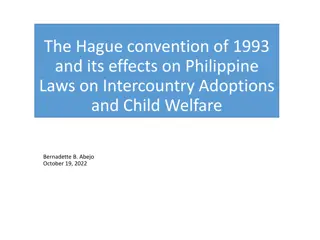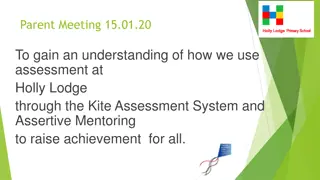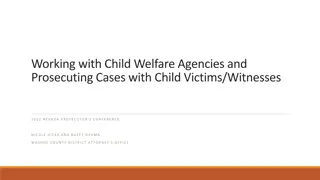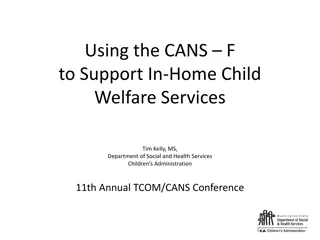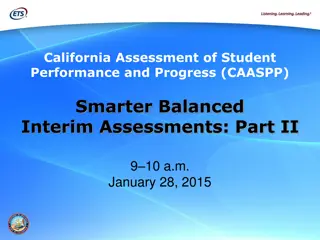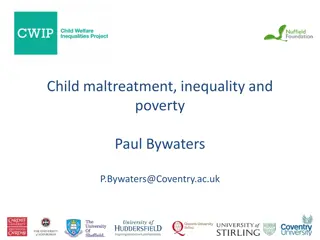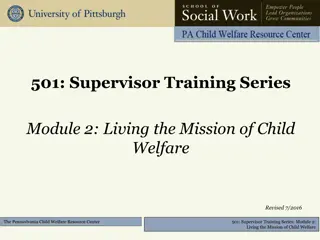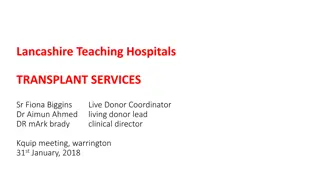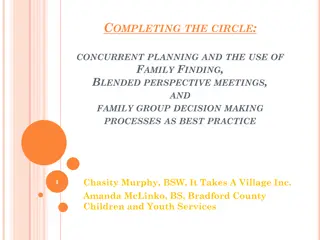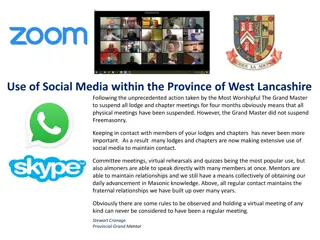Lancashire Assessment and Planning Framework: Enhancing Child Welfare Through Comprehensive Assessments
The Lancashire Assessment and Planning Framework outlines the approach for assessing and managing child welfare cases in Lancashire. It emphasizes the importance of effective assessment, planning, and interventions to meet the needs of children and families. The framework integrates tools like the Continuum of Need and the Common Assessment Framework to ensure a coordinated and timely response. Social work assessments play a crucial role in understanding the child's situation, identifying unmet needs, and developing tailored interventions. By prioritizing the child's well-being and involving families in the assessment process, the framework aims to improve outcomes and support the child's journey effectively.
Download Presentation

Please find below an Image/Link to download the presentation.
The content on the website is provided AS IS for your information and personal use only. It may not be sold, licensed, or shared on other websites without obtaining consent from the author.If you encounter any issues during the download, it is possible that the publisher has removed the file from their server.
You are allowed to download the files provided on this website for personal or commercial use, subject to the condition that they are used lawfully. All files are the property of their respective owners.
The content on the website is provided AS IS for your information and personal use only. It may not be sold, licensed, or shared on other websites without obtaining consent from the author.
E N D
Presentation Transcript
Lancashire Assessment and Planning Framework Victoria Gent
Introduction The Lancashire Assessment and Planning Framework sets out how in Lancashire we will assess, plan and manage cases where there are concerns about a child and where it is recognised that there is a need for social work intervention and assessment. This framework is applicable to all open cases, for example, children subject to CAF, children with a child in need plan or child protection plan. On-going assessment is essential, to avoid drift and ensure timely decision making based on effective, evidence based assessment. The assessment process will replace the current initial and core assessments. 2
Continuum of Need and CAF The importance of the continuum of need and Thresholds Guidance sets out the importance of early support for families; it highlights and supports the emphasis on both assessment and planning when working with families and focusses on the need to empower them. The Lancashire Common Assessment Framework(CAF) is a shared assessment and planning tool for use across all children's services in Lancashire. The CAF promotes a coordinated approach on how these needs should be met. This should lead to fewer children and young people in need of specialist assessments and support. 3
The purpose of social work assessments The purpose of an assessment is to gather information and evidence about a child and their family and identify whether a child has unmet needs. An assessment is not an end in itself but the means of informing the delivery of effective services for children and families. An assessment should be a continuous process which has the needs of the child at the centre. The assessment is completed by a social worker and will build on information already known as a result of early help to the child and family and previous or ongoing involvement with Children's Social Care. An assessment must be completed by a qualified social worker. The assessment must be based on sound knowledge of child development and be seen in the context of the child s family and their environment. 4
contd The social worker leads the assessment which must be informed by the child and their family members and other professionals who know them. The Lancashire Assessment and Planning Framework ensures that the child and family experience a single assessment and planning process. Active planning with families at the earliest opportunity should identify and put in place services or interventions which will deliver the right help to children and families at the right time. This framework should develop a robust understanding of the child's journey to date and evidence the impact of existing plans in place at the point of referral and during subsequent assessments. The use of chronologies should inform planning, interventions and the approach to assessment. 5
contd Early planning will complement and inform a process of robust assessment, but changes in circumstances should prompt a proportionate review of current interventions and not lead to open ended assessments . Professional judgement and management oversight should identify when reassessment or a change in plan should be considered. Examples might include; A Section 47 Enquiry is instigated. There has been a significant change in the child's living circumstances or arrangements. When entering a pre proceedings process. If a child has come into care or is at risk of coming into care. 6
Assessment Planning and assessment should deliver an agreed plan, with clear outcomes which can be measured as part of formal review and performance management arrangements. Assessments should be timely, transparent and proportionate to need. How quickly an assessment is carried out will be determined by the needs of the child and any level of harm being suffered. This will require judgements to be made by the social worker in discussion with their manager on every case and should be clarified by the manager at the point of allocation. 7
Assessment Timescales and Checkpoints No social work assessment should take more than 45 days to complete unless there are exceptional circumstances. In Lancashire the following timescales have been set as checkpoints; Within 1 day The social worker and their manager must make a decision about the type of response that is required. The practice/team manager will set a timescale at the outset of the assessment process for its completion. This date will be shared with the family/child and relevant partners. Where a child is suffering or likely to suffer significant harm the child must be seen by a qualified social worker immediately to assess their welfare (within a maximum of 24 hours).
contd Within 10 working days Managers must review the progress of the assessment by day 10. This is checkpoint 1 The manager must enter the date they reviewed the assessment and any comments on the child's record. The manager and the social worker should agree at this point the date by which the assessment should be completed (if not already) and if the case is to remain open as a Child in Need case, the date for the Child in Need meeting must be agreed. The child must be seen by a qualified social worker as soon as possible following a referral. Professionals working with the child and family must make a decision on the timing of this visit, based on their assessment of the child's needs. In all cases this must not exceed 10 days.
contd Within 30 days Where it is identified that assessments will take longer than 10 days to complete, the assessment and understanding of the child's needs will be discussed with the social worker by the manager prior to the 30th day and the timescale for completion will be agreed. This is checkpoint 2
contd Within 45 days No social work assessment should take more than 45 days to complete. If in exceptional circumstances this is likely to take more than 45 working days, this must be approved by a senior manager. For Child in Need cases, a planning meeting should be held between the 15th and 45th day.
Practice in all assessments.. Feedback must be given to the referrer on decisions made and actions taken. The child and family must be informed. It is important that children and families understand their role within the assessment ; the social worker has the responsibility of ensuring how the assessment will be carried out and when they can expect a decision to be made about the next steps. The conclusion of the assessment must be shared with the child and family and they must be given a hard copy of the assessment Delay in providing services can have an impact on a child's development. Professionals must not wait until the conclusion of an assessment before providing services to support the child and their family 12
contd *The social worker must discuss the child's case with other professionals and agree how quickly meetings should be convened so that children are kept safe and help is provided which meets the needs of the child and their family. *The framework for assessment is a conceptual framework used to gather information *Provide clarity on the contributions of all agencies and professionals that will undertaking assessments and services *Include a good analysis 13
